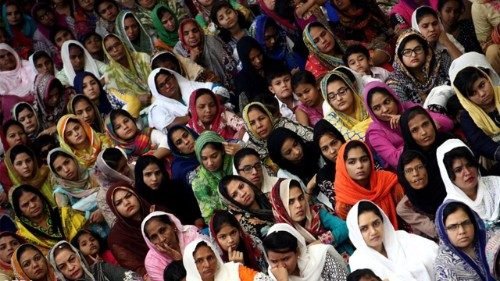Pakistan’s religious minorities have submitted a 10-point memorandum asking Prime Minister Imran Khan and his government to adopt policies to safeguard the rights of minorities and women.
By Robin Gomes
Pakistan, where the state religion is Islam, has a population of around 197 million, of which at least 95 percent is Muslim. Hindus make up the largest minority group, followed by Christianity and others.
Among those who signed the memorandum at a press conference in Karachi on Aug. 8 were representatives of the country’s Muslim, Hindu, Sikh, and Baha’i communities. The initiative was organized by the Italian chapter of Aid to the Church in Need (ACN), a Catholic charity and foundation that helps persecuted Christians worldwide, and by Catholic advocate Tabassum Yousaf, linked to the Community of Sant’Egidio peace group.
Rights and protection
The joint-resolution asks that the minimum age for marriage of girls be raised from 16 to 18. It calls for the establishment of a federal ministry for religious minorities, a reservation of a 5% quota for national and international educational scholarships for minorities, the protection of minorities’ houses of worship from government seizure and to provide spaces for worship for minority communities in areas such as jails, hospitals and state institutions.
The minorities also call for legislation to prevent discrimination against minorities in employment, education and society, the elimination of material that encourage hatred in books, and government subsidies for security at minorities’ schools.
“We intend to focus on issues related to our freedom, our fundamental human rights, prejudices and discrimination that exist in particular towards people of religious minorities and forced conversions of women of religious minorities,” Tabbasum Yousaf told the Vatican’s Fides news agency.
The religious leaders are also asking for government subsidies for security at minorities’ schools.
A specific request touches on the problem of abductions, sexual violence and forced conversions of women belonging to religious minorities, asking for legislation to counteract the phenomenon.
At an event organized in Islamabad on July 29, in view of the August 11 National Minority Day, Imran Khan said that forced conversion is un-Islamic. He explained that the Prophet Muhammad himself had given minorities religious freedom and protected their places of worship, “because the Quran orders that there be no compulsion in religion”.
“How can we then take it into our own hands to forcefully convert someone to Islam — either by marrying [non-Muslim] women […] or on gunpoint or to [by threatening to] kill someone because of their religion?” he asked.
Blasphemy laws
The joint resolution also asks that minorities “be given particular protection” against the abuse of the country’s controversial blasphemy laws.
Insulting the Prophet Muhammad in Pakistan is a crime punishable by death, while offending the Koran, Islam’s holy book, incurs life imprisonment. Rights organizations say the law is often misused to settle personal scores.
Former Punjab governor, Salman Taseer, and the Minister for Minorities, Shahbaz Bhatti, a Catholic, were both assassinated in 2011 after they defended Catholic woman Asia Bibi and spoke out against her death sentence and the misuse of the blasphemy laws.
Pakistan’s Supreme Court acquitted Bibi on October 31, 2018, ordering her release.
According to figures by the National Commission for Justice and Peace (NCJP) of the Pakistan Catholic Bishops’ Conference (PCBC), 16 people were arrested or booked for blasphemy in 2018: nine Christians, four Ahmadis (deemed heretics by radical Islam), two Muslims and one Hindu.
Second-class citizens
Discrimination against Christians also occurs in the workplace. Sanitation work is reserved for Christians.
“We are 100% sons and daughters of this land; we should not be treated as second-class citizens,” said Fr. Saleh Diego, vicar general of the Archdiocese of Karachi, who was present at the August 8 press conference.
At an August 11 National Minorities Day event in Lahore, several Christian leaders highlighted the rise of intolerance in the country and the abuse of the blasphemy laws.
According to Archbishop Sebastian Shaw of Lahore, “Minority is not a good word.” “It should be called the Day of Unity or Msaawat (equality),” he told AsiaNews. He lamented, “ We [Christians] played an equal role in the creation, defence, welfare and development of Pakistan but our contributions are not part of the syllabus.”
The Government of Pakistan declared 11 August as National Minority Day in 2009, much due to the efforts of Bhatti who also set up the All Pakistan Minorities Alliance in 2002.



